There are a fair number of SF novels that focus not on individual characters but on the society of which they are a part. Often the novels do so by focusing on the development of those cultures over time. Societies evolve; individuals come and go like mayflies. There’s a narrative, but not the sort of narrative we usually expect to enjoy.
You might think that it would be hard to make such books interesting. (I don’t think that anyone has ever described The Decline and Fall of the Roman Empire as a cracking thrill ride: “Could not put it down!”) The following five novels show that it is possible to write interesting works that take the long view.1
The Healer by F. Paul Wilson (1976)
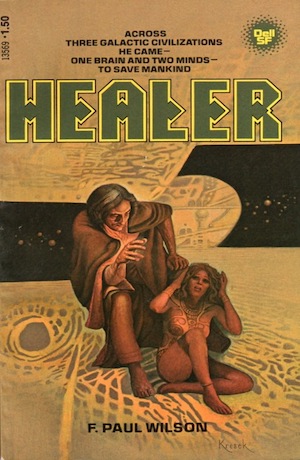
Wilson has written a novel that spans generations but nevertheless has one consistent viewpoint character. Steven Dalt takes refuge in a cave on a backwater world, only to fall prey to an alien “alaret” lurking on the ceiling. Luckily for Dalt, while “of every thousand struck down [by alarets], nine hundred and ninety-nine will die,” Dalt is one in a thousand. Instead of painful death, he acquires an alien symbiont, “Pard,” who shares his body. Apart, both faced short lives. Together, they survive centuries.
Dalt’s native LaNague Federation is named for founding father and ardent libertarian Peter LaNague. Rather atypically for states founded by libertarians in novels written by libertarians, the Federation proved largely disinterested in LaNague’s political philosophy. They preferred more state-based solutions. Dalt and Pard’s immortality allows them to observe as the consequences play out over centuries.
***
Where Late the Sweet Birds Sang by Kate Wilhelm (1976)
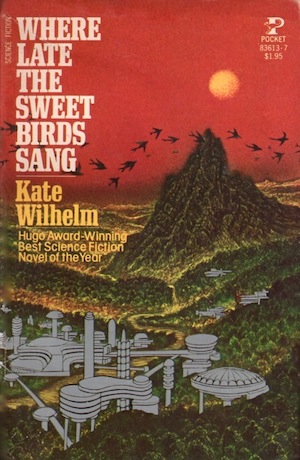
Industrialization brought unprecedented wealth to humanity. Admittedly, this had certain regrettable consequences, like widespread pollution. Which has led to mass extinctions of various species. Oh well…omelet, eggs, we got rich. Then humans discover that humans are not immune to the mass sterility sweeping the world. Absent heroic measures, the current generation of humans will be the last one ever.
The wealthy Sumner clan owns a vast estate in the Shenandoah Valley. There the Sumners intend to wait out doomsday. It just so happens that the estate is equipped with an advanced medical facility that includes cloning technology. Human infertility will not end the Sumner clan. Instead, each new generation will be populated by carbon copies of those who came before. This might seem like a recipe for eternal stagnation, save for the fact that even clones are not identical and change is inevitable…
***
The Dazzle of Day by Molly Gloss (1998)
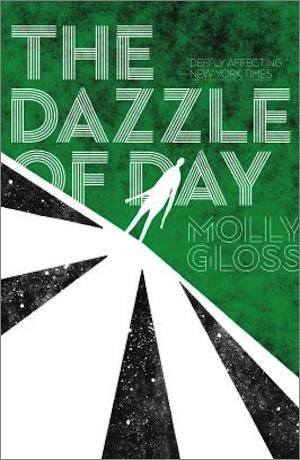
Bold visionaries uninhibited by practicality created orbital habitats. Reality then asserted itself in the form of total life support collapse in said habitats. A community of Quakers with a fancy to travel to a nearby star system (there to colonize its terrestrial world) have acquired the habitat for a reasonable fee, refurbished it, and equipped it with a vast solar sail. A failed experiment became the starship Dusty Miller.
The Dusty Miller is blindingly fast compared to 20th-century rockets, but it’s still going to take many, many years to reach the stars. One hundred and seventy-five years pass before the Dusty Miller reaches its destination. Once it arrives, the Quakers face the task of settling a marginally habitable world. The challenge is monumental and survival comes at a terrifying price!!!—that is, embracing the Quaker values of community spirit, frank dialogue, and peaceful compromise.
***
Accelerando by Charles Stross (2005)
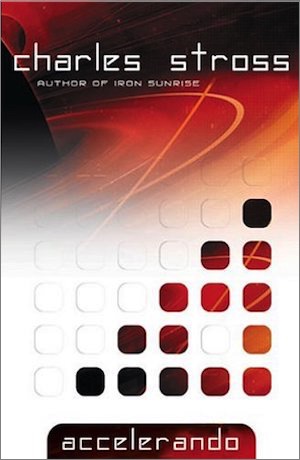
The breakneck pace of progress in the 20th century was merely foreshadowing for what was to come in the 21st. Accelerating technological sophistication took Earth up to and past the Singularity. What fate awaits that Quaternary relic, humanity, as its creations match and then exceed human intelligence?
Just as other primates didn’t vanish simply because humans came along, so humans like “venture altruist” Manfred Macx do their best to prevail in a world where humans are no longer the apex of intellect. Over three generations, the Macxes watch as their Solar System is transformed by increasingly alien beings. Ultimately, however, human ingenuity has cost the species the Solar System—if humans have a future, it lies elsewhere.
***
Children of Time by Adrian Tchaikovsky (2015)
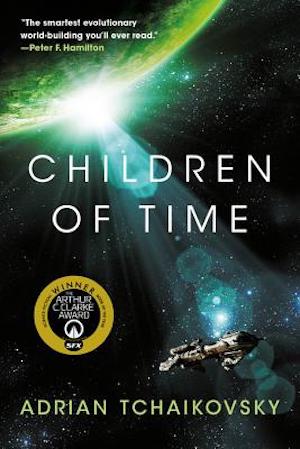
Doctor Kern did not personally terraform the nameless world twenty light-years from Earth but she plans to shape its destiny. Kern intends to seed what she dubs Kern’s World with monkeys infected with a nanovirus. The virus has been designed to force the monkeys along a deterministic path towards a new and better species, one far superior to disappointing humanity. Alas, her bold vision has failure points. Points which doom it.
The monkeys die on their way to the surface. The nanovirus, on the other hand, makes planetfall. Lacking its intended host, the nanovirus abandons Chordata in favour of Arthropoda. Kern’s World is ruled by generation after generation of very bright, surprisingly social spiders. Humans will one day make their way to Kern’s World, where they will either find some way to deal with the spiders or perish.
***
Of course, these are not the only five authors to take the long view of society. After all, I mention a sixth2, even a possible seventh, in the footnotes3. Feel free to mention your own favourites, and works you might even consider the foundation of this sub-genre. Comments are below.
In the words of Wikipedia editor TexasAndroid, prolific book reviewer and perennial Darwin Award nominee James Davis Nicoll is of “questionable notability.” His work has appeared in Publishers Weekly and Romantic Times as well as on his own websites, James Nicoll Reviews and the Aurora finalist Young People Read Old SFF (where he is assisted by editor Karen Lofstrom and web person Adrienne L. Travis). He is a four-time finalist for the Best Fan Writer Hugo Award and is surprisingly flammable.
[1]If only I had not just used Aldiss’ Helliconia for a different piece…
[2]See 1.
[3]Because I don’t care for the Mars trilogy. That’s why I didn’t mention it.










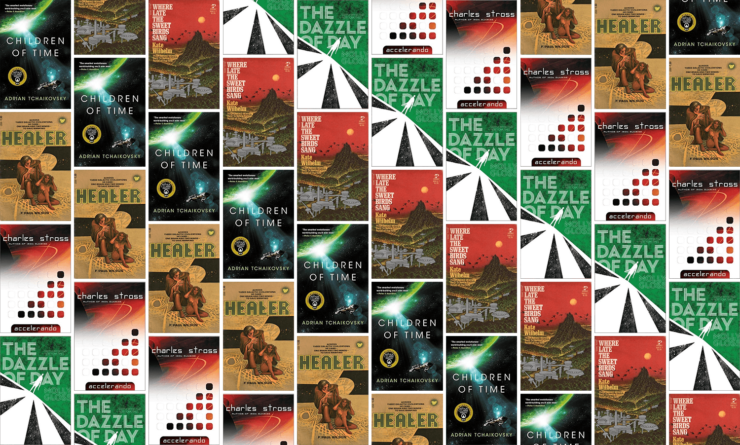
Asimov’s Robot/Foundation novels. I really need to revisit them. But what if they’ve aged as badly as his short stories?
I really enjoyed most of Wilhelm’s Where Late the Sweet Birds Sang except for the very end
Poul Anderson’s The Boat of a Million Years follows a small group of naturally immortal humans as they navigate millennia of human existence and eventually set out for the stars. I will admit, I found the “surviving history” first half to be more compelling than the “relationship drama on a spaceship” second half…
It seems mandatory to mention Olaf Stapledon’s Last and First Men and Star Maker — neither of which I’ve read, but intend to one of these days.
What about Stapledon’s “Starmaker”? It dwarfs the time scale of these others. Also Vernor Vinge’s “Marooned in Realtime” is an interesting take on a murder mystery unraveling over thousands of years.
John Brunner’s The Crucible of Time fits here, although it’s ineligible for the article because you covered it two months ago
Wilson missed the opportunity to connect one of Dalt/Pard’s earlier adventures (featuring a telepathic computer that they left to its own devices) with the plague of telepathically transmitted terror that shows up later.
Starquake by Robert Forward covered centuries of time – from the point of view of the aliens who live a million times faster than humans.
Robert Charles Wilson’s Spin, Axis, Vortex trilogy does this. Really the first book – which is the best IMHO – does this to some extent by itself.
And, of course, there’s Joe Haldeman’s The Forever War, which covers quite the span. And, I suppose, Larry Niven’s A World Out of Time, which handily skips right over the interval and goes straight to three million years or so in the future.
Mark S. Geston’s Lords of the Starship
Yes, my first thought was Stapledon’s Last and First Men, which covers the whole future history of the human species and its seventeen successor human species, right up to the end of the Solar System… and then Star Maker, which summarizes the whole of Last and First Men in one brief paragraph, then goes on to cover the history of the universe entire.
Another book which springs to mind is Bernhard Hennen and James A. Sullivan’s massive fantasy The Elven, whose protagonists skip in and out of fairyland and therefore, effectively, travel forward in time – as this substantial and well-populated fantasy takes shape (I think it actually does contain a kitchen sink at one point), it becomes clear that it’s a story about history, that the actions of the protagonists shape the destiny of nations for centuries to come. (Translated from the original German by Edwin Miles. Because translators need recognition, darn it.)
Would House of Suns by Alastair Reynolds count?
Would all of Robert Reed’s Greatship stories count?
My mind went straight to Asimov’s Robots and Empire, um, series? Also E.E. Smith’s Lensmen series goes from pre-planetary coalescence to a goodly many centuries in the future, so it counts as well, IMO.
How about Mike Resnick’s novel Birthright?
Covered tens of thousands of years.
Just as you’d recently discussed Helliconia, you have also recently covered Clifford Simak and City, which most certainly fits the Long Game. Another, similar Old School voice who spun a long-game perspective was Raymond Z. Gallun and The Eden Cycle (1974). Both of these books are way too good to lie forgotten.
Well, Foundation is sort of a gimme here, but A Canticle for Leibowitz also comes to mind.
John C. Wright’s six-book “Eschaton Sequence” (Count to a Trillion (2012) et seq.) is about a future-Texas gunslinger-lawyer and his Spanish-born frenemy as they disagree about politics, severely misapprehend the motivations of aliens, and repeatedly re-engineer human society and biology in response to those misapprehensions. They don’t become immortal posthumans just because they’re waiting for their mutual love interest to return from a ten thousand-year STL interstellar trip, but it certainly helps when the reunion is progressively deferred.
The sequence coins the term “sophotransmogrification” for the teleological effort to transform all of the universe’s mass into thinking matter. It turns out that brains the size of stellar clusters, with unavoidable lightspeed lags, have different timescales and priorities than mayfly organics. The gunslinger is basically a Star Trek optimist-libertarian Richard Seaton from a hardscrabble childhood, and the Spaniard is an elitist-monarchist Blackie Duquesne with an even more hardscrabble origin, and they’re both impossibly stubborn.
“Cloud Atlas” by David Mitchell.
The Years of Rice and Salt covers about a thousand years of alternate history by way of reincarnating the protagonists. It’s quite unlike the Mars Trilogy, all things considered, but James still might not like it. Having typed that, I realize it’s unlike anything I’ve ever read. I liked it quite a bit.
Came here to mention Asmov’s Foundation series, though I see others have as well (woo!). Also, don’t forget The Three Body Problem series by Cixin Liu. Both so good.
Karl Schroeder’s LOCKSTEP verse also takes place over long periods of time, where the inhabitants sleep for long periods between each very short waking.
Mur Lafferty’s Six Wakes is a locked-room mystery (of a sort) in a slower-than-light spaceship. The time in the spaceship only covers days, if that, but the events leading up to the mystery cover centuries. And the reason the villain can carry out their plot is because they can plan for the very long term.
It’s a very good SF mystery.
Just remembered another one Peter Watts’ Freeze Frame Revolution.
The classic long-view-in-a-little-space story: “Compounded Interest”, by Mack Reynolds. An interesting explanation for a lot of history. His novella “The Rival Rigellians” (aka “A Plague on Both Your Isms“) covers a couple of generations of uplift experimentation.
Cherryh’s Forty Thousand in Gehenna covers several generations (for certain values of “cover” — ISTM that much long-span SF spends a lot of words on setup and progressively fewer on each generation).
ISTR Marta Randall’s Journey covering several decades, especially when Dangerous Games is added — but I read it so long ago I couldn’t swear to more than one generation. There are several more examples right on the tip of my mind but they won’t come up, even if I include multi-book sets.
@19: I felt the authorial hand lying very heavily on Years of Rice and Salt. OTOH, I admit I haven’t particularly liked any KSR. Just not my cuppa, I guess.
I see John C. Wright has been mentioned. A series where flinging entire galaxies at your enemies like bullets sort of implies long timescales.
Tchaikovsky sure likes bugs, doesn’t he?
Great picks @10 and @23. Yes and yes, in that order, @12.
If Helliconia hadn’t been disqualified, I’d have cited it, and I’m sure a number of others also would have.
I’d like to add The Centurian’s Empire by Sean McMullen, published in 1998 by none other than Tor. It’s a terrific novel where a Roman Centurian uses a form of suspended animation to travel into the future, awakening every few centuries.
I adore Accelerando. It’s my favorite Stross.
L.E. Modesitt’s The Forever Hero series, which sees the protagonist live long enough to rejuvenate an ecologically shattered Earth as galactic empires rise and fall.
Unfortunately biological immortality doesn’t protect from mental senescence, and Gerswin’s eventual fate is truly tragic.
Disagree 100%. The first two octavo volumes, at any rate, are full of juicy goodness and the 1st volume was a controversial best-seller.
With that said, thanks for the column covering a lot of stuff which is new to me and looks interesting.
I wonder if Crawford Kilian’s The Empire of Time and its prequels might fit in here. It’s been a while since I read them, but he seemed to be using the contrasting Chronoplanes to be talking about history itself–how we discover it, invent it, interfere with it, destroy it.
hmm. perhaps joe haldeman’s 2004 tiptree and nebula award winning novel camouflage? the two protagonists spend ~1m years on earth.
Perhaps not strictly speaking a Science Fiction novel but Tom Robbins’ “Jitterbug Perfume” features a multi-generational protagonist whose immortality is interrupted by a life-long prison sentence.
I’m surprised the epitome of the “long view of history” hasn’t been mentioned, the Long Now Foundation, although I suppose it doesn’t count, being a real organisation, and not a fictional book. However, their aims are certainly science-fictional, they are currently building the 10,000 year clock, which is designed to last ten thousand years.
This inspired (and was inspired by) Anathem by Neal Stephenson, which although the narrative only covers a year or so, it deals with institutions that are thousands of years old.
Also by Stephenson, Seveneves has a multi-millennial timespan.
Haldeman’s The Accidental Time Machine covers a long long time frame.
Not only Foundation but Asimov did an “all of history” in a SHORT STORY.
“The Last Question“
Seveneves and the Last Question were the two that were top of mind when I saw this topic. After looking at other nominations, I’d strongly second Accelerando for this topic.
And if “long view” is measured only in hundreds of years, there is always Time Enough for Love by Heinlein.
As I think of it, there are also Brust’s Taltos novels, where members of the dominant race commonly live well over 1,000-plus years and one in particular has been around for 20,000-plus.
Daniel Keys Moran’s short story “On Sequoia Time” presents the world across several centuries from the planting of a sequoia tree forward. It’s available (with the author’s permission) here, along with other of his stories:
https://www.immunityinc.com/resources/daniel-keys-moran-mirror.html
A. E. van Vogt’s “The Weapon Shop” goes from the Big Bang to some time aeons in our future.
Stephen Baxter’s “The Light of Other Days” (not to be confused with Bob Shaw’s great short story) goes from 3 billion years ago to sometime unimaginably in the future.
Also – no-one’s mentioned the Xeelee books by Stephen Baxter? Vacuum Diagrams covers the entire history of the universe!
Does Tau Zero count?
I’m shocked nobody has mentioned “Cities in Flight”, that spans everytime from the near-now to the Big Crunch (and the next Big Bangs).
@everyone: James himself used the f-word.
“Tad of Union” as it appeared on the first edition. :-)
(I a tech ed!)
Just for the record, The Decline and Fall of the Roman Empire is read now as much as a work of literature as a work of history, so at least some people can’t put it down, even if it’s not a thrill ride. Thrill ride not being the only measure of literary quality or even of a rewarding read.
It may be too new for most to be familiar with, but Stronger, Faster, and More Beautiful by Arwen Dayton is a linked set of short stories that cover a large time period (I’ve forgotten how long). The commonality of them is not a person, but of a cultural shift that the author tracks through time.
Thought of Larry Nivens Protector. Not sure if it was that book one of the others in the same universe. Haven’t read it since the 70s.
A Canticle for Leibowitz strikes me an foundational here.
@40 Along those same lines (though it isn’t that long for the crew…). Poul Anderson’s “Tau Zero”. They actually last until the next Big Bang to find a place to slow down and live on.
(I was also thinking of a TV series, Babylon 5″ and its last episode of Season 4 – “The Deconstruction of Falling Stars”. Takes it after the events in the B5 universe, to the “Big Burn”, mankind crawling back to the stars and ending with humans becoming Vorlon-like as the Sun, triggered by some unkown force, goes Nova, and they take possession of the Vorlon Homeworld. Thousands, millions of years of “history”.)
Alastair Reynolds’ Pushing Ice focuses on a small group of humans who come to be very very far removed from the Solar system, in both space and time. The ultimate fate of the rest of the human race ends up affecting their subjective present (yay relativity).
Not really a fan of it, but Dune stands to mind. Loved the book itself, but the series left me feeling betrayed. Foundation series had its points, but ended poorly to me. Both those are in my unlikely to read again pile. Clarke’s 3001 was too Godless. People will have some connect to monotheism regardless of time, methinks. Yet I think The Time Machine should be mentioned, the very father of long view science fiction.
I think The Three Body Problem fits in there.
What about EVOLUTION by Stephen Baxter? It’s a thinly disguised sermon for space flight by the end, and I find it touching that a science conference was so important a terrorist organization would pay any attention to it, but it is a good, long-reaching read.
The Rissa Kerguelen series by F.M. Busby. The characters are dealing with a repressive regime on Earth, and have to take a long view due to the great distances between Earth and colony worlds
All this talk about mayflies, and nobody mentioned Mayflies, by Kevin O’Donnell Jr. Generation ship whose star drive is borked by the formerly human main computer, so they have to take the long way to their destination. Societal upheaval, First and Second contacts, generational drama, it has everything.
First one that should be included is Foundation, and no, I don’t think it’s too old and outdated. The world of the Galactic Empire described is not what is important as much as the concepts involved in the future evolution of human civilization, especially as described in the later books in the series written in the 1980s.
Kim Stanley Robinson is certainly overlooked here, but not for the Mars Trilogy. If we’re talking the long view it doesn’t really qualify. His first novel written, The Time of Whiteness, certainly does, set in 3229 AD, and with humanity inhabiting almost every nook and cranny of the solar system. 2312 is similarly set in a human saturated solar system in a relatively distant future.
Lastly, I think you have to give Heinlein’s future history at least an honorable mention.